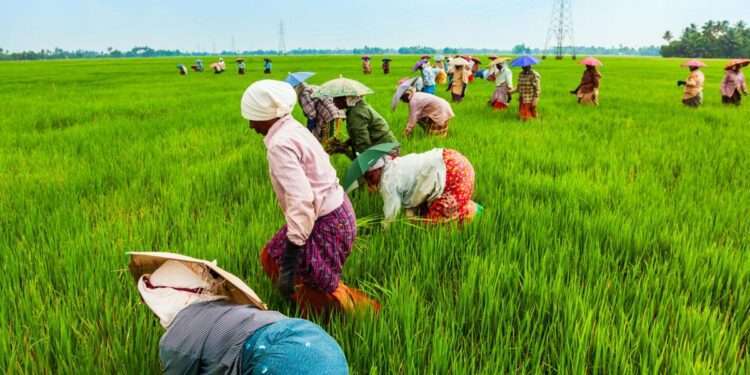The Peasant Farmers Association of Ghana has expressed profound disappointment and condemnation towards the recent approval of 14 novel Genetically Modified Organisms (GMOs) by the Government of Ghana.
The Association in a press statement issued by its National President, Wepia Addo Awal Adugwala vehemently opposed the decision, citing detrimental effects on the agricultural sector and the sovereignty of Ghanaian farmers.
The National President of the Peasant Farmers Association of Ghana further argued that the commercialization approval, granted by the National Biosafety Authority (NBA), which encompasses eight maize and six soya bean products seeks to promote the interests of multinational seed corporations rather than safeguarding the welfare of local farmers.
Mr Awal Adugwala also criticized the government’s actions, highlighting a pattern of neglect towards farmers’ concerns attributing the situation to the passage of the Plant Variety Protection Act in 2020.
He argued that the passage of the Plant Variety Protection Act in 2020 paved the way for the commercialization of Genetically Modified Organisms despite earlier assurances by the government to prioritize traditional breeding methods over Genetically Modified Organisms.
“This comes on the back of the release of the GM cowpea in 2022, which was also done at the blind side of farmers and Ghanaian consumers.
“While we find this development disturbing, we are not particularly surprised, as we predicted that neglecting the resistance of key stakeholders against the passage of the Plant Variety Protection Act, 2020, which was just a leeway and a canopy to allow the commercialization of GMO products which are meant to promote the interest of four multinational seed companies; Bayer, Corteva, Syngenta and Group Limagrain that controls over 50% of the seed sector globally”.
Wepia Addo Awal Adugwala, National President PFAG
Criticisms against Genetically Modified Organisms
Furthermore, the Peasant Farmers Association of Ghana argued that Genetically Modified Organisms are not the solution to Ghana’s agricultural challenges.
The National President of the Association in his statement cited the impressive productivity of local farmers using traditional seeds and emphasised the urgent need to address issues such as climate change, mechanization, access to finance, post-harvest losses, and input costs.
He noted that even though Ghanaian farmers without government support managed to produce so many grains, tubers and vegetables in the 2023 farming year, they are currently struggling for the market.
According to him, all efforts for the government to assist with market access have failed, making the various rice and maize farmers depending on traders in Burkina Faso and Togo for their market.

Moreover, the Peasant Farmers Association of Ghana, Wepia Addo Awal Adugwala warned against likely dire consequences resulting from the approval of Genetically Modified Organisms if not rescinded by the government.
He noted that the move is likely to lead to the loss of indigenous agricultural practices and control over food production, asserting that multinational corporations will dictate the trajectory of Ghana’s food system.
His concerns extended beyond economic implications with him expressing grave concerns about the potential health risks associated with genetically modified organic consumption.
‘The experiences of COVID-19 and the Russia-Ukraine crises on food nationalism and protectionism should have given our leaders a hint of not sacrificing the control of a country’s production system, particularly seeds, into the hands of multi-nationals”
Wepia Addo Awal Adugwala, National President PFAG
In addition, the National President of the Peasant Farmers Association of Ghana decried the erosion of the culture of seed-saving and exchange, which has been fundamental to Ghana’s agricultural heritage.
He thus called on the government, particularly the Ministry of Food and Agriculture to take immediate measures that would ensure that genetically modified organic varieties are not included in ongoing agricultural programs in the country.
He also called for transparency from the National Biosafety Authority regarding the approval process and labelling of genetically modified organic products.
The National President of the Peasant Farmers Association of Ghana concluded his statement by stressing that the association intends to resist attempts by the government to reintroduce colonial influences in the agricultural sector under the guise of technological advancement.
He noted that the association is engaging in collaborative efforts with other stakeholders to formulate a comprehensive plan of action to safeguard the interests of Ghanaian farmers.
READ ALSO: Israeli Military Aid Juggernaut Spared While Germany Faces ICJ Heat



















